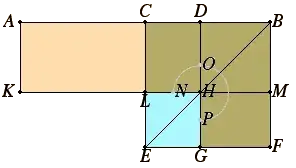The elementary properties of the exponential function:
$e^{a+b} = e^{a}e^{b}$
$\left(e^{a}\right)^{b} = e^{ab}$
$e^{2\pi i} = 1$
$\frac{d}{dz}e^{cz} = ce^{cz}$
Where to begin? Let me count the ways.
The first three equations basically give you all of group theory, field theory, lie algebra, harmonic analysis, and number theory. Equation I is the prototypical example of the exponential map in lie theory; it is also probably the first instance of a truly significant homomorphism any of us come across. The success and failure of Equation I in various spaces underlies foundational issues in functional calculus—non-commutativity of operators). It also is the crux of semigroup theory, and hence, quite a bit of the study of dynamical systems. And, of course, where would quantum mechanics be without the exponential function—Hilbert spaces of wave-functions, or l
Lie algebras, Heisenberg groups, and gauge theories. (Also, this gives us transistors, and hence, the handy dandy laptop computer on which I am typing this prose ode to the exponential function.) Equation II (with the help of Equation III) gives you all the cyclic groups, and hence, abstract algebra. Roots of unity are foundational objects in number theory and field theory. Gauss, Kronecker, Dirichlet, and so many others have shown just how important roots of unity are, both in their own right, and as intersectional objects that provide the links between many different areas of algebra and number theory. Cyclic groups lead to characters, which lead to L-functions, group algebras, class number formulae, explicit formulas for the prime-counting function, and god knows what else—and maybe even K-Theory.
Aside from further illustrating some of the already mentioned concepts, multiplying both sides of Equation III by $e^{z}$ and then using Equation I to obtain the $2\pi i$ periodicity of $e^{z}$ gives us even more; it is the prototypical example of a periodic function, and hence, of an automorphic forms. This, when generalized, leads to elliptic functions and modular forms—Ramanujan's playground. Thanks to Andrew Wiles, we know that we can then proceed not only to prove Fermat's Last Theorem, but also move on to algebraic geometry (elliptic curves). Then, as always, the Bernoulli suddenly numbers appear for some magical reason, which bring us back to number theory: the Riemann zeta function. And boy, do we get a lot of mileage from $\zeta\left(s\right)$. If you look out the window to your left, you can see the Weil Conjectures, and frolicking herds of special functions—the Gamma functions, Zeta Functions, and lots of Polylogarithms (and, again— somehow—K theory).
When you look out the window to your right, you'll see various important Frenchmen—Fourier, Poisson, Legendre, Laplace, Poincaré, Schwartz (to name a few). The periodicity of the exponential function (and hence, the trigonometric functions) leads to the formulation of Fourier series, empowering us in the study of partial differential equations and, eventually, functional analysis, the study of dual spaces, and the theory of distributions. Off in the distance is Mount Navier-Stokes, still waiting for someone to be the first to ascend to its peak. This fourier foray brings us naturally to Equation IV, which underpins most of (all?) integral and differential calculus. Linear algebra emerges just as naturally from the study of differential equations, where we can see the exponential function as the eigenfunction of the derivative—the prototypical differential operator. The study of differential operators in more general contexts gives us yet more functional analysis—and also the algebraic notion of derivations. And, if you're willing to make the leap, the study of integration leads to differential geometry, which leads to Einstein, cohomology, and even category theory.
I can go on.



$$ $$ 1) Fermat last theorem : $\forall x, y, z \in \mathbb Z, x^n+y^n=z^n, n \geq 3 \implies xyz=0$, whose proof by Wiles–Taylor–Ribet–Langlands–... is very deep.
– Watson Dec 24 '19 at 15:52$$ $$ 3) Mordell conjecture : for every non-zero $a \in \Bbb Z$, there are only finitely many rational numbers $x,y \in \Bbb Q$ such that $y^2 = x^5 + a$. This was proved by Faltings in 1983 ; he was awarded the Fields medal typically for these works.
– Watson Dec 24 '19 at 15:52